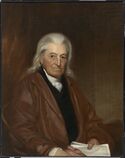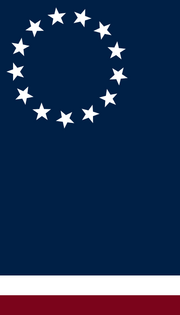List of Leaders of the Federal Union of Arcadia
Jump to navigation
Jump to search
Arcadian Free States (1792-1795)
| No. | Title | Name (Birth–Death) |
Portrait | Party | Vice President | Term of office | Elections Won | Notes | |
|---|---|---|---|---|---|---|---|---|---|
| 1 | Presiding Representative | John Solomon (1740-1811) |
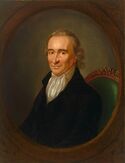
|
Independent | N/A | July 7th 1792 |
September 13th 1795 |
1792 | While not technically a President of the Federal Union of Arcadia, John Solomon is widely considered to be the first President and most renowned Founding Father. |
Confederacy of Arcadia (1799-1809)
Federal Union of Arcadia (1809-present)
| No. | Name (Birth–Death) |
Portrait | Party | Vice President | Term of office | Elections Won | Notes | |
|---|---|---|---|---|---|---|---|---|
| 1 | Josaiah Beckwith (1738-1830) |

|
Union Party | John St. James | July 7th 1809 |
July 6th 1812 |
N/A | After the Federal Constitution established the Federal Union, Beckwith transitioned to the office of the President of the Federal Union of Arcadia. He did not seek another term as President. |
| 2 | Wallace Stockton (1738-1830) |
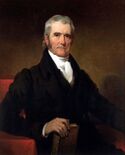
|
Union Party | Horatio Beckwith | July 7th 1812 |
July 6th 1820 |
1812 1816 |
Stockton was a staunchly religious Beaconer, and in keeping with the beliefs of the Grand Lodge, enacted universal male suffrage in 1814, followed by the abolishment of slavery in 1816. |
| 3 | Noah Callahan (1784-1849) |
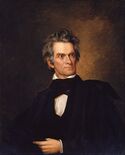
|
Union Party | Henry Garrison | July 7th 1820 |
January 15th 1826 |
1820 1824 |
While initially quite popular for his populist and nationalist zeal, as well as his oratory skills, Callahan's administration was drenched in scandals that resulted in his impeachment in 1826. |
| 4 | Henry Garrison (1777-1839) |
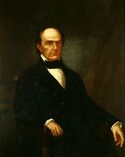
|
Union Party | Benson Gwinnett | January 16th 1826 |
July 6th 1830 |
N/A | Garrison assumed the Presidency after the impeachment of Noah Callahan. Henry Garrison had a quiet presidency and elected not to run in the 1830 presidential elections, preferring to return to the Senate. |
| 5 | James McClintock (1780-1850) |

|
Union Party | Thomas Lee Edward Locke |
July 7th 1830 |
July 6th 1838 |
1830 1834 |
McClintock was one of the chief architects of early Arcadian expansionist policy. Numerous expeditions and federally-sanctioned western settlement efforts were undertaken by his administration |
| 6 | Edward Locke (1787-1862) |

|
Union Party | William Kinkaid | July 7th 1838 |
July 6th 1842 |
1838 | After serving for a term as Vice President for President McClintock, Locke handily won the 1838 election. After resolving numerous complicated foreign affairs disputes, Locke declined to run for a 2nd term after the tragic death of his wife and two sons in a fire. |
| 7 | Jameson Crowley (1789-1849) |

|
Union Party | William Kinkaid | July 7th 1842 |
July 6th 1846 |
1842 | As a close political ally of the popular Edward Locke, Crowley stepped in to take the Unionist nomination with the help of Vice President William Kinkaid. Continuing the policies of the previous administration proved popular, though Locke's re-entry to politics ended Crowley's chances of re-election. |
| 8 | Edward Locke (1787-1862) |

|
Union Party | William Kinkaid | July 7th 1846 |
July 6th 1850 |
1846 | The first president to serve two nonconsecutive terms, Locke's previous popularity carried him to an easy electoral win over his opponents. Stricken by occasional bouts of depression, Locke remained deeply private for his 2nd term. |
| 9 | William Kinkaid (1777-1855) |
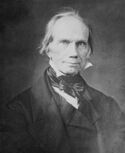
|
Union Party | John Woodworth | July 7th 1850 |
July 6th 1854 |
1850 | While coasting off the popularity of the previous 2 Presidents and his own successful 3-term stint as Vice President, Kinkaid became deeply unpopular following the economic crash of 1852. Widely considered one of the worst Presidents of Arcadian history, the Union Party never recovered from his administration. |
| 10 | Milton Henry Garrison (1809-1876) |
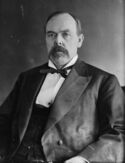
|
Arcadian National Party | John Woodworth | July 7th 1854 |
July 6th 1858 |
1854 | The son of previous President Henry Garrison, Milton was quite unlike his father. After winning an upset in the 1854 election against a split-ticket Union ballot, Garrison's nativist Arcadian National Party took the Presidency, though he remained a lame duck, as his party held the smallest minority in the Senate, at 8 seats. |
| 11 | Sebastian Vance (1812-1883) |
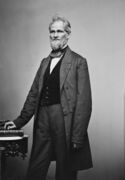
|
Liberal Party | William B. Gordon | July 7th 1858 |
July 6th 1870 |
1858 1862 1866 |
Vance remains one of the few 3-term Presidents, a feat he accomplished on account of the success of his economic and expansionist policies. The Free Soil Acts, his declaration of the Vance Doctrine, and both the Siouan and Numic Republics being admitted to the Union secured his position as one of the most widely regarded Presidents in Arcadian history. |
| 12 | Zachariah Stanton (1821-1899) |
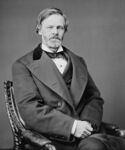
|
Liberal Party | Theodore J. Greene | July 7th 1870 |
July 6th 1878 |
1870 1874 |
Zachariah Stanton, already popular for his role in establishing the Liberal party, coasted to the Presidency with ease, despite a strong and well-funded Arcadian National Party opponent. Stanton cracked down on the Cattle Barons and tried to put down the Cattle Wars, but was unable to overcome Senate opposition to Federal intervention. |
| 13 | Oliver Stanton (1824-1898) |
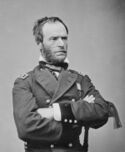
|
Liberal Party | Zachariah Stanton | July 7th 1878 |
July 6th 1882 |
1878 | General Oliver Stanton, brother of the previous President, was elected as a single-issue President: end the Cattle Wars. With his brother as a running mate, Oliver was able to finally secure Senate support to send Federal troops and recruit Native Arcadian Auxiliaries to put down the Cattle Barons. The General chose not to seek re-election and returned to the Army. |
| 14 | Theodore J. Greene (1834-1904) |
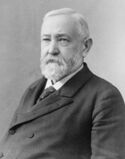
|
New Union Party | William Watts | July 7th 1882 |
July 6th 1888 |
1882 1884 |
Greene, as a successful former Vice President, was sought out by the newly-founded New Union Party as a conservative candidate. Greene's tenure was uneventful beyond the continued efforts to pacify the west- a policy he supported enthusiastically. |
| 15 | Henry Noble (1837-1901) |
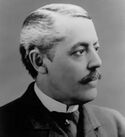
|
New Union Party | Horace Potter | July 7th 1888 |
July 6th 1896 |
1888 1892 |
After making a career as a talented artillery officer, Henry Noble entered business and became a fabulously wealthy railroad tycoon before entering politics and effectively buying his way to the office of the Presidency. While possessing a talent for diplomacy and foreign affairs, declining health resulted in his 2nd term being one of general idleness. |
| 16 | Robert Whitfield (1840-1913) |
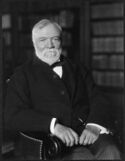
|
Liberal Party | Andrew McDonald | July 7th 1896 |
July 6th 1904 |
1896 1900 |
As both an immigrant and a habitually philanthropic banking magnate, Robert Whitfield embodied the contemporarily popular upper-class idea of success in business. While a staunch laissez-faire capitalist, Whitfield made great strides in establishing Federal parks and supporting educational institutions, effectively continuing his private philanthropic work. |
| 17 | Calvin G. Morgan (1856-1908) |
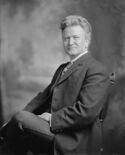
|
Progressive Party | S.A. Bulloch | July 7th 1904 |
May 5th 1908 |
1904 | Calvin G. Morgan entered the 1904 race with little hope of winning, but a surge of support from labor unions and immigrants was able to push him past the Liberal and New Union candidates. Enacting strong Progressive policies across the board, Morgan was intensely popular among the working class. His assassination by a reactionary extremist in 1908, shortly before the election, was considered a national tragedy. |
| 18 | S. A. Bulloch (1861-1933) |

|
Progressive Party | Willem Jones Grady Harrison |
May 5th 1908 |
July 6th 1920 |
1908 1912 1916 |
Practically a national symbol of heroism and masculinity before he served as VP for President Morgan, Silas Augustus Bulloch easily swept the election of 1908 and went on to serve 3 terms as a firebrand progressive. Legalizing women's suffrage, supporting workers' rights, building the Navy into a world-class force, and supporting the continued immigration of countless foreign workers to Arcadia kept Bulloch fantastically popular. |
| 19 | Castor Blackhorse Clark (1862-1930) |
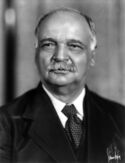
|
Progressive Party | Desmond Adenhart | July 7th 1920 |
July 6th 1928 |
1920 1924 |
Castor Clark, often referred to by his informal honorific "The Blackhorse," continued the Progressive Party's utter dominance in Arcadian politics for another 2 terms before failing health forced him not to seek reelection for a third term. Another intensely popular President, he also had the distinction of being the first indigenous Arcadian President. Clark's iron grip over the innerworkings of his own party was both a strength and a weakness- his retirement effectively collapsed centralized party leadership, and their ensuing electoral defeat resulted. |
| 20 | C. M. Crowley (1890-1972) |

|
New Union Party | Louis Chambers Castaigne | July 7th 1928 |
July 6th 1932 |
1928 | Cassius Morgan Crowley and his jingoistic running mate Louis Chambers Castaigne were born-and-bred members of the highly conservative northeastern Free State establishment, and they were voted in almost solely due to the egregious infighting of the Progressives and the outright unlikableness of the Liberal candidates. While initially popular due to their support for the Naval programs initiated by President Bulloch years before, the pair quickly lost favor nearing the election year on account of their failure to keep the sputtering economy moving. Crowley would go on to become a world-class author, after his Presidency. |
| 21 | Wallace Wayne (1894-1990) |
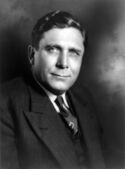
|
Liberal Party | Howard Lawson | July 7th 1932 |
July 6th 1940 |
1932 1936 |
Wallace Wayne was a fantastically charismatic candidate throughout the election, appealing both to elitist liberals, working class progressives, and even some eastern conservative aristocrats. Wayne was one of the first major figures to advocate for global Arcadian influence and foreign policy, eschewing over a century of staunch neutrality and isolationist trends. Economic liberalization and trade agreements with overseas partners pushed Arcadia, economically, vastly ahead of all of its competition during his tenure in office. |
| 22 | Robert Ryan Stark (1907-1966) |
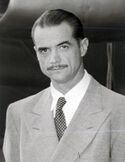
|
Liberal Party | Anthony Aaron | July 7th 1940 |
July 6th 1948 |
1940 1944 |
Previously an industrial magnate, Robert Ryan Stark became a symbol of the Arcadian Ideal- that of an educated, hard-working, faithful man. Though Stark was a !Catholic, and the first one to be elected to the Presidency, the increasingly liberal Beaconer establishment was enamored by his self-made success, even ignoring his famously frequent dalliances with the various movie and entertainment stars of the day. Maintaining Arcadian neutrality throughout the !Second World War, Stark nevertheless committed to a very large militarization program to beef up Arcadian defense. |
| 23 | Hogarth Running Horse (1886-1963) |
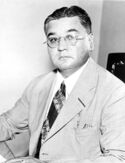
|
Progressive Party | Randall Pierce | July 7th 1948 |
July 6th 1952 |
1948 | Running Horse, the Progressive Party's first President since 1928, ran on a very specific platform of renewing and updating the numerous aging public welfare and jobs programs that had languished under decades of Liberal and New Union rule. While still holding on to Arcadian neutrality, this became an increasingly unpopular position among young and middle-aged voters in the aftermath of the !Second Great War, resulting in a defeat on foreign policy ideas in his 2nd election. |
| 24 | Terrence Fitzgerald (1885-1962) |

|
New Union Party | James "Jimmy" Gordon | July 7th 1952 |
July 6th 1960 |
1952 1956 |
Terrence "Old Fitz" Fitzgerald made history by declaring the end of Arcadian neutrality and beginning the era of the Fitz Doctrine. In keeping with that doctrine, Fitzgerald sought to band the various democratic nations together against what he viewed as a concerted effort by communists, fascists, and nationalists to defeat the idea of democracy and liberalism. While also a conservative Beaconer, Fitzgerald managed to rally both the Progressives and the Liberals to agree to large increases in military spending, as well as the first attempts to establish a cohesive alliance of likeminded nations. |
| 25 | William Reeves (1910-2001) |

|
Liberal Party | Don L. Reid | July 7th 1960 |
July 6th 1972 |
1960 1964 1968 |
Initially painted as an outside candidate, William Reeves benefitted immensely from the series of scandals that tanked virtually all of his opponents in the 1960 election. Taking the reigns of the seemingly developing cold war between Arcadia and her enemies, Reeves enthusiastically went about strengthening the Arcadian military, as well as challenging the nation's opponents in espionage and diplomacy across the world. Under Reeves 3 terms, the economy strengthened, the Federal Dollar became the reserve currency for virtually all of Arcadia's allies, and strong anti-discrimination laws were put in place. |
| 26 | Spencer Ford (1919-2006) |
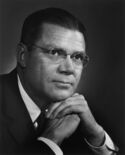
|
New Union Party | Leroy Gomes | July 7th 1972 |
July 6th 1980 |
1972 1976 |
Spencer Ford was a well-liked NUP Senator for years before his election to the Presidency. His terms were eventful, with a number of foreign policy and military crises cropping up, along with a general economic downturn that began late in Ford's second term. In response to many of the crises that his administration faced, Ford began numerous large-scale military modernization programs during his Presidency, while also earning a reputation as a hawkish, shrewd player of realpolitik and a vociferous opponent of Vierzland. |
| 27 | Bennett Cole (1930-2019) |
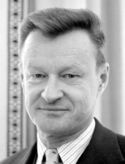
|
Progressive Party | Donovan James | July 7th 1980 |
July 6th 1992 |
1980 1984 1988 |
Bennett Cole, one of the most popular Arcadian Presidents of the 20th Century, assumed office during a recession, as well as the height of tensions between Arcadia and numerous international opponents. Cole managed to retain a Progressive majority in the Senate for 8 of his 12 years in office, and an alliance with the Liberals for his last 4 years, giving him a great deal of latitude with which to secure new worker's rights legislation, universal healthcare, universal college education, and a foreign policy that focused on multilateral cooperation with allies like the Thalassic Federation. President Cole remained an important figure in Arcadian politics until his death. |
| 28 | Donovan James (1947-present) |
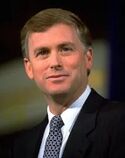
|
Progressive Party | Bill Red Wing | July 7th 1992 |
July 6th 1996 |
1992 | Initially coasting off of the popularity of his predecessor, the former Vice-President Donovan James was not quite able to maintain the momentum he inherited from a decade of popular and effective Progressive reforms. After bungling a number of finance reforms, capitulating to NUP/Liberal demands for lower taxes, and increasing deficits, James was defeated in a shock 1995 Progressive Party Primary. James's most often remembered success was his program to modernize Arcadian freeways. |
| 29 | Jimmy Goldman (1941-present) |
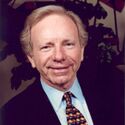
|
New Union Party | Alan Cleaves | July 7th 1996 |
July 6th 2000 |
1996 | Jimmy Goldman entered the office as a lame duck, fighting a Senate that was dominated by Liberals and a decaying Progressive Party, while his own NUP kept up solid 3rd place in seats. In 1998, Goldman failed to institute widely demanded finance and stock market reforms, mostly due to Progressive and Liberal hangups on both the scope of the bill, as well as enormous amounts of pork barrel spending and earmarks inserted by NUP Senators. Many economists and pundits blame the failure of this bill for the subsequent Millenium Crash in 2000. Goldman was primaried in 1999 and lost; the Crash the following year cemented the end of his political career. |
| 30 | Harry Runningwolf Jenkins (1939-present) |
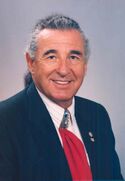
|
New Union Party | Wayne Lee | July 7th 2000 |
July 6th 2008 |
2000 2004 |
Despite the catastrophic economic crisis brought about by the Millenium Crash in 2000, the NUP managed to retain the Presidency. Harry Runningwolf Jenkins had run a highly effective ad campaign blaming the Liberals and Progressives for the failure by the Federal government to regulate the market properly, and the result was 2 easily won elections. Jenkins was populist to the core and managed to secure tax breaks, austerity on less popular programs, and huge increases to military spending once the economy began to roar back to life in 2006. |
| 32 | Lincoln Ellis (1965-present) |
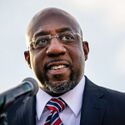
|
Liberal Party | Mitchell J. Cole | July 7th 2008 |
July 6th 2016 |
2008 2012 |
Lincoln Ellis rose to the top of the Liberal Party after the party had spent 36 years away from the Presidency. After years of NUP dominance and Liberal/Progressive decay, Ellis promised to bring a breath of fresh air into the Liberals. After a contentious election in which even the Progressive Party endorsed Ellis as candidate, he beat the NUP challenger. The Ellis Presidency went on to be quite successful, with a greatly rebounded economy and record-low crime and poverty rates. Minor criticism was directed at the perceived focus on domestic affairs at the expense of foreign affairs. |
| 33 | Mitchell J. Cole (1953-present) |
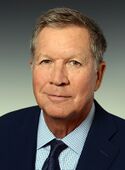
|
Liberal Party | Tony W. Red Horse | July 7th 2016 |
Present | 2016 2020 |
Mitchell J. Cole, son of the previous President Bennet Cole, took the endorsement of Lincoln Ellis in 2016 and swept the election with ease. Acting with a more hawkish foreign policy and a progressive domestic policy, Cole has enjoyed overwhelming support from his own party, as well as cautious support from the Progressives, despite their hopes to reclaim the Presidency in 2024. |
